- Home
- V. S. Naipaul
Literary Occasions Page 8
Literary Occasions Read online
Page 8
I had written a book, and I felt it to be real. That had been my ambition for years, and an urgent ambition for the past year. And I suppose that if the book had had some response outside the freelances’ room I might have been a little more secure in my talent, and my later approach to writing would have been calmer; it is just possible.
But I knew only anxiety. The publisher that Andrew Salkey took the book to sent no reply for three months (the book remained unpublished for four years). And—by now one long year out of Oxford—I was trying to write another, and discovering that to have written a book was not to be a writer. Looking for a new book, a new narrative, episodes, I found myself as uncertain, and as pretending to be a writer, as I had been before I had written the story of Bogart.
To be a writer, I thought, was to have the conviction that one could go on. I didn’t have that conviction. And even when the new book had been written I didn’t think of myself as a writer. I thought I should wait until I had written three. And when, a year after writing the second, I had written the third, I thought I should wait until I had written six. On official forms I described myself as a “broadcaster,” thinking the word nondescript, suitable to someone from the freelances’ room; until a BBC man, “staff,” told me it was boastful.
So I became “writer.” Though to myself an unassuageable anxiety still attached to the word, and I was still, for its sake, practising magic. I never bought paper to write on. I preferred to use “borrowed,” non-rustle BBC paper; it seemed more casual, less likely to attract failure. I never numbered my pages, for fear of not getting to the end. (This drew the only comment Ernest Eytle made about my writing. Sitting idly at his typewriter one day in the freelances’ room, he read some of my pages, apparently with goodwill. Then, weightily, he said, “I’ll tell you what you should do with this.” I waited. He said, “You should number the pages. In case they get mixed up.”) And on the finished manuscripts of my first four books—half a million words—I never with my own hand typed or wrote my name. I always asked someone else to do that for me. Such anxiety; such ambition.
The ways of my fantasy, the process of creation, remained mysterious to me. For everything that was false or didn’t work and had to be discarded, I felt that I alone was responsible. For everything that seemed right I felt I had only been a vessel. There was the recurring element of luck, or so it seemed to me. True, and saving, knowledge of my subject—beginning with Bogart’s street—always seemed to come during the writing.
This element of luck isn’t so mysterious to me now. As diarists and letter-writers repeatedly prove, any attempt at narrative can give value to an experience which might otherwise evaporate away. When I began to write about Bogart’s street I began to sink into a tract of experience I hadn’t before contemplated as a writer. This blindness might seem extraordinary in someone who wanted so much to be a writer. Half a writer’s work, though, is the discovery of his subject. And a problem for me was that my life had been varied, full of upheavals and moves: from my grandmother’s Hindu house in the country, still close to the rituals and social ways of village India; to Port of Spain, the negro and G.I. life of its streets, the other, ordered life of my colonial English school, which was called Queen’s Royal College; and then Oxford, London and the freelances’ room at the BBC. Trying to make a beginning as a writer, I didn’t know where to focus.
In England I was also a colonial. Out of the stresses of that, and out of my worship of the name of writer, I had without knowing it fallen into the error of thinking of writing as a kind of display. My very particularity—which was the subject sitting on my shoulder—had been encumbering me.
The English or French writer of my age had grown up in a world that was more or less explained. He wrote against a background of knowledge. I couldn’t be a writer in the same way, because to be a colonial, as I was, was to be spared knowledge. It was to live in an intellectually restricted world; it was to accept those restrictions. And the restrictions could become attractive.
Every morning when he got up Hat would sit on the banister of his back verandah and shout across, “What happening there, Bogart?” That was a good place to begin. But I couldn’t stay there. My anxiety constantly to prove myself as a writer, the need to write another book and then another, led me away.
There was much in that call of “Bogart!” that had to be examined. It was spoken by a Port of Spain Indian, a descendant of nineteenth-century indentured immigrants from South India; and Bogart was linked in a special Hindu way with my mother’s family. So there was a migration from India to be considered, a migration within the British empire. There was my Hindu family, with its fading memories of India; there was India itself. And there was Trinidad, with its past of slavery, its mixed population, its racial antagonisms and its changing political life; once part of Venezuela and the Spanish empire, now English-speaking, with the American base and an open-air cinema at the end of Bogart’s street. And just across the Gulf of Paria was Venezuela, the sixteenth-century land of El Dorado, now a country of dictators, but drawing Bogart out of his servant room with its promise of Spanish sexual adventure and the promise of a job in its oil fields.
And there was my own presence in England, writing: the career wasn’t possible in Trinidad, a small, mainly agricultural colony: my vision of the world couldn’t exclude that important fact.
So step by step, book by book, though seeking each time only to write another book, I eased myself into knowledge. To write was to learn. Beginning a book, I always felt I was in possession of all the facts about myself; at the end I was always surprised. The book before always turned out to have been written by a man with incomplete knowledge. And the very first, the one begun in the freelances’ room, seemed to have been written by an innocent, a man at the beginning of knowledge about both himself and the writing career that had been his ambition from childhood.
2
THE AMBITION to be a writer was given me by my father. He was a journalist for much of his working life. This was an unusual occupation for a Trinidad Indian of his generation. My father was born in 1906. At that time the Indians of Trinidad were a separate community, mainly rural and Hindi-speaking, attached to the sugar estates of central and southern Trinidad. Many of the Indians of 1906 had been born in India and had come out to Trinidad as indentured labourers on five-year contracts. This form of Indian contract labour within the British empire ended, as a result of nationalist agitation in India, only in 1917.
In 1929 my father began contributing occasional articles on Indian topics to the Trinidad Guardian. In 1932, when I was born, he had become the Guardian staff correspondent in the little market town of Chaguanas. Chaguanas was in the heart of the sugar area and the Indian area of Trinidad. It was where my mother’s family was established. Contract labour was far behind them; they were big landowners.
Two years or so after I was born my father left the Guardian, for reasons that were never clear to me. For some years he did odd jobs here and there, now attached to my mother’s family, now going back to the protection of an uncle by marriage, a rich man, founder and part owner of the biggest bus company on the island. Poor himself, with close relations who were still agricultural labourers, my father dangled all his life in a half-dependence and half-esteem between these two powerful families.
In 1938 my father was taken on by the Guardian again, this time as a city reporter. And we—my father, my mother and their five children, our own little nucleus within my mother’s extended family—moved to Port of Spain, to the house owned by my mother’s mother. That was when I was introduced to the life of the street (and the mystery of the negro carpenter in the servant room, making “the thing without a name”). That was also when I got to know my father.
I had lived before then (at least in my own memory) in my mother’s family house in Chaguanas. I knew I had a father, but I also knew and accepted that—like the fathers of others of my cousins—he was not present. There was a gift one year of a very small book o
f English poetry; there was a gift another time of a toy set of carpenter’s tools. But the man himself remained vague.
He must have been in the house, though; because in the subsidiary two-storey wooden house at the back of the main building there were—on the inner wall of the upstairs verandah—jumbled ghostly impressions of banners or posters he had painted for someone in my mother’s family who had fought a local election. The cotton banners had been stretched on the verandah wall; the beautiful oil paint, mainly red, had soaked through, disfiguring (or simply adding to) the flowered designs my mother’s father (now dead) had had painted on the lower part of the verandah wall. The glory, of the election and my father’s banners, belonged to the past; I accepted that.
My mother’s family house in Chaguanas was a well-known local “big house.” It was built in the North Indian style. It had balustraded roof terraces, and the main terrace was decorated at either end with a statue of a rampant lion. I didn’t like or dislike living there; it was all I knew. But I liked the move to Port of Spain, to the emptier house, and the pleasures and sights of the city: the squares, the gardens, the children’s playground, the streetlights, the ships in the harbour.
There was no American base at the end of the street. The land, still hardly with a name, known only as Docksite, had just been reclaimed, and the grey mud dredged up from the harbour was still drying out, making wonderful patterns as it crusted and cracked. After the shut-in compound life of the house in Chaguanas, I liked living on a city street. I liked looking at other people, other families. I liked the way things looked. In the morning the shadows of houses and trees fell on the pavement opposite; in the afternoon our pavement was in shadow. And I liked the municipal order of each day: the early-morning cleaning of the streets, with the hydrants turned on to flood the green-slimed gutters with fresh water; the later collection of refuse; the passing in mid-morning of the ice-cart.
Our house stood on high concrete pillars. The newspaper man threw the Guardian as high as he could up the concrete front steps. This delivery of a paper was one of the novelties of my Port of Spain life. And I also knew that, because my father worked for the Guardian, the paper was delivered free. So I had a feeling of privilege, a double sense of drama. And just as I had inherited or been given a feeling for lettering, so now I began to be given ambitions connected with the printed word. But these ambitions were twisted. They were not connected with the simple reporting that my father was doing for the Guardian at that time—he didn’t like what he was doing. The ambitions were connected with what my father had done for the Guardian long before, in that past out of which he had so suddenly appeared to me.
My father had a bookcase-and-desk. It was a bulky piece of furniture, stained dark red and varnished, with glass doors to the three bookshelves, and a lipped, sloping, hinged lid to the desk. It was made from pine and packing crates (the raw, unstained side panel of one drawer was stencilled Stow away from boilers). It was part of the furniture my father had brought from where he had been living in the country. I was introduced to this furniture in Port of Spain, recognized it as my father’s and therefore mine, and got to like each piece; in my grandmother’s house in Chaguanas nothing had belonged to me.
Below the sloping lid of the desk, and in the square, long drawers, were my father’s records: old papers, where silver fish squirmed and mice sometimes nested, with their pink young—to be thrown out into the yard for chickens to peck at. My father liked to keep documents. There were letters from a London writing school, letters from the Guardian. I read them all, many times, and always with pleasure, relishing them as things from the past; though the raised letter-heads meant more to me than the letters. There was a passport with my father’s picture—a British passport, for someone from the colony of Trinidad and Tobago; this passport had never been used. And there was a big ledger in which my father had pasted his early writings for the Guardian. It was an estate wages ledger; the newspaper cuttings had been pasted over the names of the labourers and the wages they had been paid week by week.
This ledger became one of the books of my childhood. It was there, in the old-fashioned Guardian type and lay-out—and not in the paper that fell on the front steps every morning, sometimes while it was still dark—that I got to love the idea of newspapers and the idea of print.
I saw my father’s name in print, in the two spellings, Naipal and Naipaul. I saw the pen-names that in those glorious days he had sometimes also used: Paul Nye, Paul Prye. He had written a lot, and I had no trouble understanding that the Guardian had been a better paper then. The Chaguanas that my father had written about was more full of excitement and stories than the Chaguanas I had known. The place seemed to have degenerated, with the paper.
My father had written about village feuds, family vendettas, murders, bitter election battles. (And how satisfying to see, in print, the names of those relations of my mother’s whose ghostly election banners, from a subsequent election, I had seen on the verandah wall of my mother’s family house!) My father had written about strange characters. Like the negro “hermit”: once rich and pleasure-seeking, now penniless and living alone with a dog in a hut in the swamp-lands. The Guardian called my father’s hermit Robinson Crusoe. Then, true to his new name, this Crusoe decided to go to Tobago, Crusoe’s island; he intended to walk there; and, fittingly, there was no more about him. There was the negro woman of 112 who said she remembered the days of slavery when “negroes were lashed to poles and flogged.” That didn’t mean much; but the words (which made one of the headlines) stuck, because I didn’t know that particular use of “lash.”
My father had his own adventures. Once, on a rainy night, and far from home, his motorcycle skidded off the road and for some reason he had to spend the night up a tree. Was that true? I don’t remember what my father said, but I understood that the story was exaggerated.
It didn’t matter. I read the stories as stories; they were written by my father; I went back to them as to memorials of a heroic time I had missed. There was something about the ledger I noticed but never asked about, accepting it as a fact about the ledger: the clippings stopped quite suddenly; at least a third of the book remained unused.
In the Guardian that came to the house every day my father’s name didn’t appear. The style of the paper had changed; the reporting was all anonymous. The paper was part of the drama of the early morning, but I was interested in it only as a printed object. I didn’t think to look for what my father had written.
The fact was I was too young for newspapers. I was old enough only for stories. The ledger in the desk was like a personal story. In it the ideas of “once upon a time” and my father’s writing life in old Chaguanas came together and penetrated my imagination, together with Charles Kingsley’s story of Perseus (a baby cast out to sea, a mother enslaved), which was the first story my father read to me; the early chapters of Oliver Twist; Mr. Murdstone from David Copperfield; Mr. Squeers. All this my father introduced me to. All this was added to my discovery of Port of Spain and the life of our street. It was the richest and most serene time of my childhood.
It didn’t last long. It lasted perhaps for two years. My mother’s mother decided to leave Chaguanas. She bought a cocoa estate of 350 acres in the hills to the north-west of Port of Spain, and it was decided—by the people in the family who decided on such matters—that the whole family, or all its dependent branches, should move there. My mother was willing enough to be with her family again. The rest of us were not so willing. But we had to go. We had to leave the house in Port of Spain. After the quiet and order of our two years as a separate unit we were returned to the hubbub of the extended family and our scattered nonentity within it.
The intention was good, even romantic. It was that the family should together work the rich and beautiful estate. It was more the idea of the commune than a continuation of the extended family life of Chaguanas, where most people had their own land and houses and used the family house as a centre. Here we all lived
in the estate house. It was a big house, but it wasn’t big enough; and the idea of communal labour turned out to be little more than the exaction of labour from the helpless.
In Chaguanas the family had been at the centre of a whole network of Hindu reverences. People were always coming to the Chaguanas house to pay their respects, to issue invitations or to bring gifts of food. Here we were alone. Unsupported by that Chaguanas world, with no one outside to instruct us in our obligations, even to ourselves, our own internal reverences began to go; our Hindu system began to fail.
There were desperate quarrels. Animosities and alliances shifted all the time; people had constantly to be looked at in new ways. Nothing was stable. Food was short; transport to Port of Spain difficult. I didn’t see my father for days. His nerves deteriorated. He had been given one of the servant rooms (we children slept anywhere). In that room one Sunday evening, in a great rage, he threw a glass of hot milk. It cut me above my right eye; my eyebrow still shows the scar.
After two years we moved back to the house in Port of Spain, but only to some rooms in it. There was a period of calm, especially after my father got a job with the government and left the Guardian. But we were under pressure. More and more people from my mother’s family were coming to Port of Spain, and we were squeezed into less and less space. The street itself had changed. On the reclaimed area of Docksite there was the American base; and at least one of the houses or yards had become a kind of brothel ground.

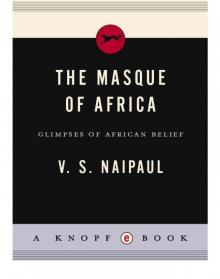 The Masque of Africa: Glimpses of African Belief
The Masque of Africa: Glimpses of African Belief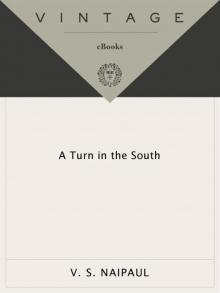 A Turn in the South
A Turn in the South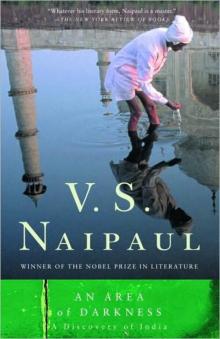 An Area of Darkness
An Area of Darkness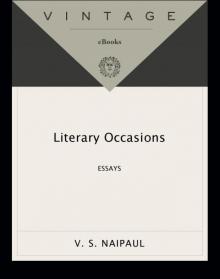 Literary Occasions: Essays
Literary Occasions: Essays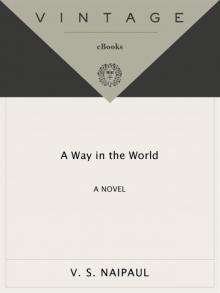 A Way in the World
A Way in the World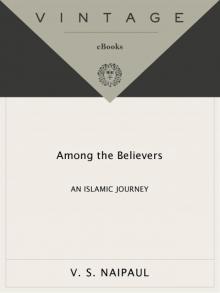 Among the Believers: An Islamic Journey
Among the Believers: An Islamic Journey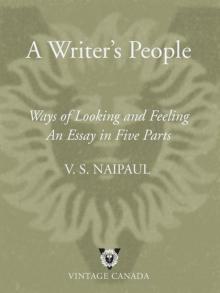 A Writer's People: Ways of Looking and Feeling
A Writer's People: Ways of Looking and Feeling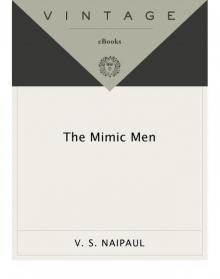 The Mimic Men: A Novel
The Mimic Men: A Novel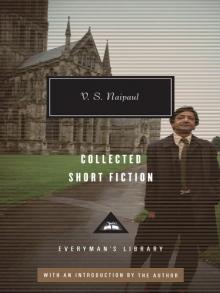 Collected Short Fiction
Collected Short Fiction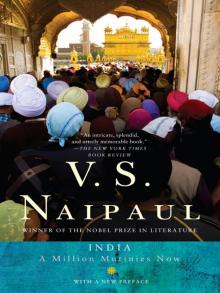 India: A Million Mutinies Now
India: A Million Mutinies Now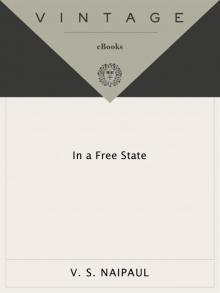 In a Free State
In a Free State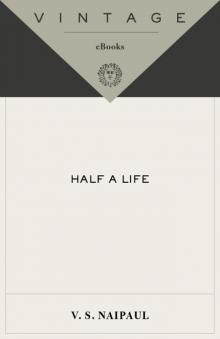 Half a Life
Half a Life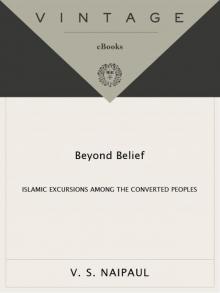 Beyond Belief: Islamic Excursions Among the Converted Peoples
Beyond Belief: Islamic Excursions Among the Converted Peoples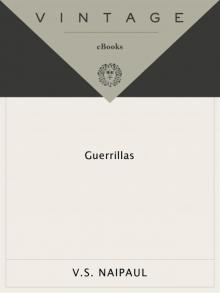 Guerrillas
Guerrillas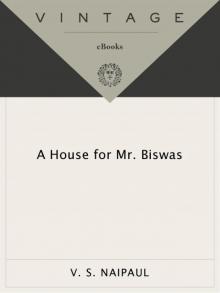 A House for Mr. Biswas
A House for Mr. Biswas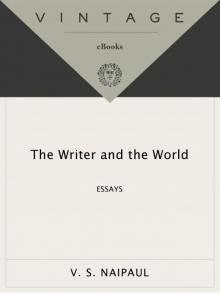 The Writer and the World: Essays
The Writer and the World: Essays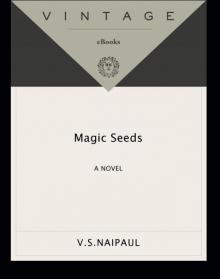 Magic Seeds
Magic Seeds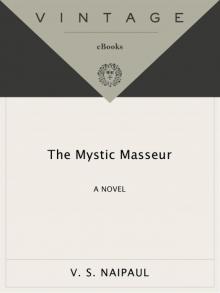 The Mystic Masseur
The Mystic Masseur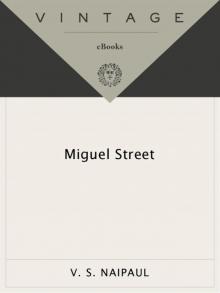 Miguel Street
Miguel Street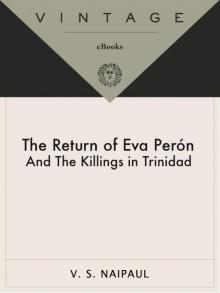 The Return of Eva Perón, With the Killings in Trinidad
The Return of Eva Perón, With the Killings in Trinidad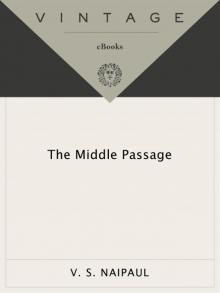 The Middle Passage
The Middle Passage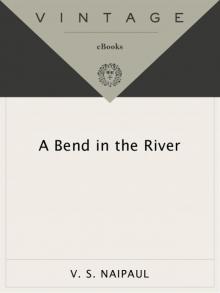 A Bend in the River
A Bend in the River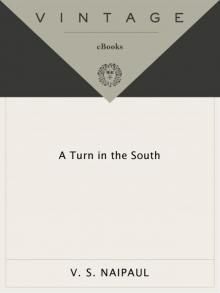 A Turn in the South (Vintage International)
A Turn in the South (Vintage International)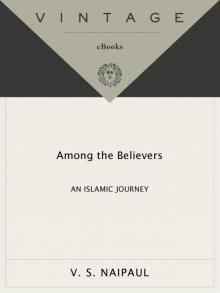 Among the Believers
Among the Believers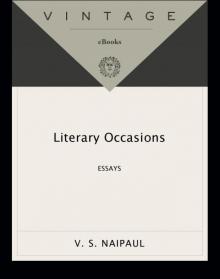 Literary Occasions
Literary Occasions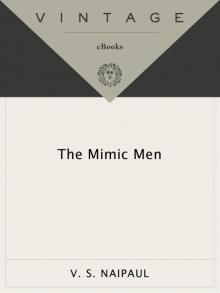 The Mimic Men
The Mimic Men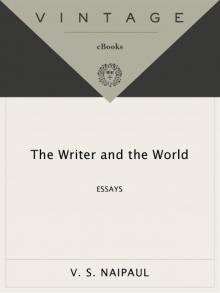 The Writer and the World
The Writer and the World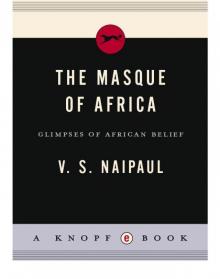 The Masque of Africa
The Masque of Africa